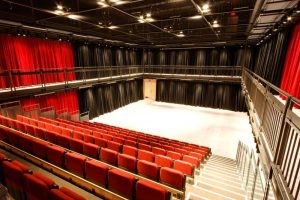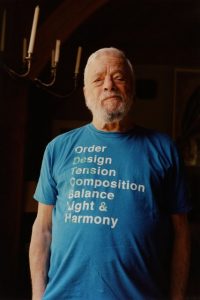Theatre is community.

Medical students rehearse Into the Woods—so that they’ll be better doctors. (Photo by Nathan Bajar for The New York Times)
OPERATING THEATRE
Do you know what all of those losers who got into medical school want to do? Musical comedy.
The medical school at New York City’s Columbia University has its own theatre and it takes seriously the effect that rehearsing and performing has on trainee doctors. According to Dr. Lisa Mellman, the senior associate dean of student affairs at the College of Physicians and Surgeons, “It enhances empathy and understanding and emotional intelligence of our students, and it translates into enhanced understanding for patients from other backgrounds and cultures.”
The young medics bring their own vocabulary to the process, of course. Rehearsing a production of Into the Woods, the director said that she wanted to the two guys singing “Agony” to rip their shirts open. When the designer asked “How far?”, the director replied, “Just to the bottom of the xiphoid process.”

Artist Hito Steyerl strongly objects to the commodification of art. This is a still from her video How Not To Be Seen: A Fucking Educational .MOV File.
CURRENCY CRISIS
What’s the currency of arts criticism these days? Is the notion of expertise outdated? Or might informed critics have a role in resisting the current trend to viewing art as a capitalist product, a kind of monetary currency?
In the world of visual art, where paintings, sculptures, and other creations are often looked upon as investments, the commodification of art is blatant. Hito Steyerl, whose own art has been locked away in vaults to accrue in value, argues that art should be more than an investment and should aspire to more than simple representation. “I think art’s role,” she says, “is to investigate the way things are comprehended – the lenses through which people see. In conflict, these lenses tend to be very standardised, very stereotypical.”
As I noted in Greenroom 11, speaking the metric-based language of Silicon Valley even Canada’s own Heritage Minister Mélanie Joly seems to be making the mistake of commodifying culture in her new policy initiative, Creative Canada.
What role might arts critics have in resisting this tendency?
The Guardian’s Peter Preston argues that the wit, learning, and judgment of trusted theatre critics are more important than their ever-decreasing ability to make or break individual shows
And some prominent theatre makers insist that the public conversations that arts critics, including theatre critics, facilitate are vital. (This position implicitly values artistic and social engagement.) When papers in Los Angeles started laying off culture writers in significant numbers in 2009, the artistic directors of three major Los Angeles theaters— Gilbert Cates of the Geffen Playhouse, Sheldon Epps of the Pasadena Playhouse and Michael Ritchie of Center Theatre Group—penned a public letter in which they called upon media outlets to recognize the importance of this dialogue.
“It may seem somewhat ironic that leaders of arts institutions would come out in favor of further criticism,” they wrote. “It would be like fire hydrants getting together to come out in favor of more dogs. But, as artistic leaders who run three of the larger theater organizations in Los Angeles, we’ve recently become worried…It’s time for us to speak up.”
+ In The Stage, critic Lyn Gardner acknowledges that theatre criticism must adapt: “What is reviewed is what is valued in the culture,” she argues. “Critical coverage is as much a diversity issue for British theatre as who gets cast in which role.”
+ This article summarizes the positions of folks, including Gardner who participated on a panel on diversity in criticism in England recently.
THE HOARSE WHISPERER
Want to know how to take care of your voice? Here are five quick tips from vocal tutor Jane Maudsley.
She advises against using extremes of the voice, including, surprisingly, whispering, which she says can inflame the vocal cords.

Award-winning set and costume designer Grace Smart knows what it’s like to be the youngest artist in the room.
SMART SET
UK set designer Grace Smart knows how easy it is “to get seduced as a designer, to wander away from what the set actually needs, in an effort to be cool, literal or beautiful.” To avoid those traps, she suggests asking a simple question: “What does this room look like to the characters and how can you translate that?”
She goes on: “Is the room a memory that has become exaggerated? Are they acutely aware of every detail? Or to them is it an empty stage with a single chair? Are they happy? Does it look beautiful to them? Or is it a beautiful room that terrifies them? How does it change?”
+ In this profile, Smart, who has won the Linbury Prize for design talks about her career and how she deals with challenges, including being the youngest artist in the room.
+ And here American set designer Deb Sevigny discusses the process of devising her own design-based show. The semi-autobiographical Hello, My Name Is… explores the experiences of Korean adoptees as they adapt to their American homes. Sevigny was adopted from Korea when she was five months old. Hello My Name Is… opens in Washington DC this weekend.

The risers in the flexible Annex Theatre can be folded into the wall. Bonus: the front door has been redesigned, so now you can find it.
THERE NO PLACE LIKE HOME
Is your theatre company looking for a home? Consider applying for the Annex Theatre residency.
According to this item from the BC Alliance for Arts + Culture, “the residency program offers successfully awarded organizations a 2 year residency at the ANNEX, including funding for 18 performances per year. In addition, organizations will gain access to the Playhouse Theatre Rehearsal Hall to utilize as a development space for up to 5 weeks per year, based on availability.”
You can find the eligibility criteria on the Vancouver Civic Theatres website. You have until December 4 to apply.

Sign up for my newsletter and find out why the conversation between Lin-Manuel Miranda and Stephen Sondheim made me cry—several times. (Photo by Colin Dodgson)
LAST CHANCE SALOON
This is the last edition of the blog feature that I’ve been calling Vancouver Greenroom. Starting next Thursday, I’m going to pour all of this industry-oriented content into my free weekly newsletter. So, if you like this stuff and you haven’t already signed up for my newsletter, get on it!
This week, my newsletter will feature an item about the interview that Lin-Manuel Miranda, the creator of Hamilton, did with Stephen Sondheim, who is, arguably, the creator of modern musical theatre.
And, as always, it will include links to all of my reviews for the week as well as the best of the writing that I’ve been doing on other platforms. I’ll feature a piece about women playing the big Shakespearean roles that are usually reserved for men, for instance, and an item about the relevance of David Henry Hwang’s play M. Butterfly to Trump’s interactions with North Korea.
Sound good? Thanks for supporting independent theatre criticism in Vancouver!






0 Comments